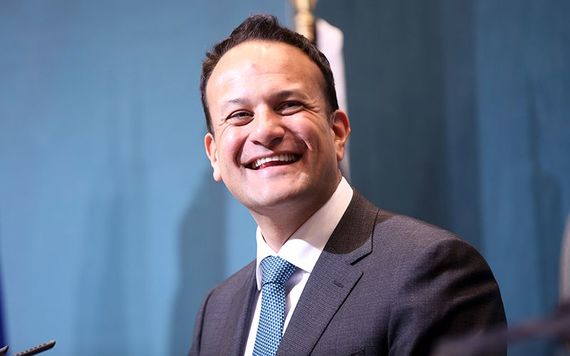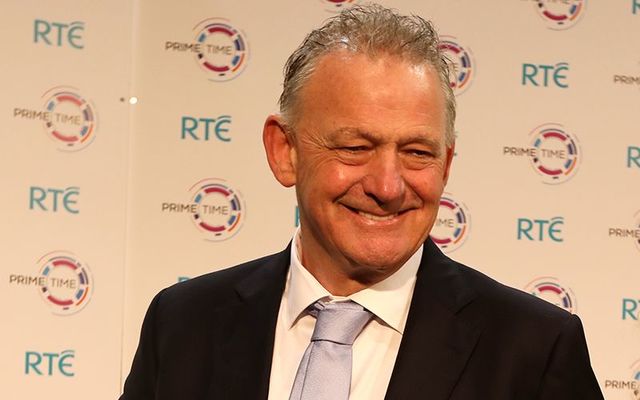With the presidential election over and Michael D. Higgins safely back for another term, politics and pub conversation in Ireland have returned to the dreary normal.
That calm may be short-lived, however, because we are now in the last critical days when a Brexit deal has to be reached, a deal which somehow does not result in a hard border in Ireland. There are rumors suggesting that a deal is almost concluded, one that would keep the entire U.K. in some kind of loose customs union with the EU and thereby remove the need for a hard border in Ireland. But this is far from certain, possibly time-limited, and whether the details would meet the requirements either of Ireland or the hard-line Brexiteers remains doubtful.
If it goes wrong, we will be into turbulence that will make the recent furor over presidential candidate Peter Casey's remarks about travelers seem like the storm in a teacup it was. There's not much point in trying to say something useful about whatever Brexit compromise is cooked up and whether it will fully solve the Irish border conundrum until we know exactly what is on offer.
But there is a good deal still to be said about the phenomenal vote the outsider Casey managed to cook up for himself in the presidential election because it was due to much more than just the row about his traveler remarks. Although that got all the coverage and stoked up all the liberal outrage, Casey had a lot more to say than his blunt comments about travelers. And it is clear now after interviews among those who backed him that his other views were a major factor in the huge vote he achieved. It now seems likely that, far from being a planned Trump-style attack on a minority to get votes, Casey blundered into creating the traveler storm without fully realizing what he was doing. If he had known in advance the reaction it was going to provoke, why would he have left it until the last week of the campaign? Having seen the media coverage it generated, however, he doubled down.
He had been catapulted from nowhere into being the leading alternative to Higgins, so he kept at it, refusing to withdraw his views about travelers being people who camped on land that belonged to others, who caused problems for the settled community and who should not be treated as a separate ethnic group. That he sincerely believed what he was saying was clear to most people who watched his interviews, whether they agreed with him or not.
Of course, that did not stop the establishment and most of the media immediately condemning him as a cynical populist. But his sincerity was clear to many voters. Many who voted for him may have wished he had gone further and commented on the crime and violence perpetrated by traveler gangs.
Equally, not everyone who voted for him may have been comfortable with him singling out travelers the way he did.
As an outsider who has spent much of his time in the U.S., he knows far less about the issue than the rest of us. What was key to Casey's appeal, however, was not just the traveler issue per se. It was the simple fact that he was brave enough to speak out and that he was unconcerned about horrifying the establishment in today's politically correct Ireland. This applied just as much to the other issues he raised in the final days of the campaign, comments which cemented his appeal.
Given the furor he had started with the traveler comments and the blanket coverage that got, it might have appeared that he had nothing else to say. But after his initial comments and his visit to the houses in Tipperary which had been built for local travelers who were refusing to move in, he did not directly raise that issue again.
Instead, he moved on to other matters, mainly to do with what he called the "welfare state" Ireland had become. It was the media that kept hounding him with questions about travelers even after he had moved on to the welfare topic. If he had wanted to exploit the traveler issue, he would have continued to bring it up himself.
But instead, he was then talking about the raw deal the so-called squeezed middle gets here, something that struck a chord with many voters in that large section of the population. These are the people on middle incomes who work hard and are squeezed relentlessly by the tax system. They are the people who pay for everything and get nothing back, Casey said, paraphrasing a line used by Leo Varadkar when he was campaigning to be Taoiseach.

Irish Prime Minister Leo Varadkar.
He said that the relief offered to them in the recent budget was "a joke" because it amounted to about two cups of coffee a week for average earners. There was nothing to reward "the people who get up early in the morning,” he added, again deliberately repeating a phrase that had been used by Varadkar before he became Taoiseach. This registered very strongly with the many squeezed middle voters who do get up early in the morning to work hard, yet at the end of the month find that they are barely keeping their heads above water.
At the same time, they see a welfare system that seems to be ever expanding and which is still eating up a huge amount of tax revenue even though the economy has recovered, and we are almost at full employment. Like the travelers, welfare reform is a no-go area and these remarks by Casey enraged the poverty lobby spokespeople here and were dismissed as "uninformed" by the establishment. But as with travelers, Casey was accurately reflecting what many people were thinking. Why does the squeezed middle have to pay so much tax? Why is it possible for some people to earn more from welfare -- when all the various benefits and payments are added up -- than it is from an average income job after tax?
After years of welfare increases during the boom, is Ireland really a "welfare state" as Casey claimed, where the hassle of working a job every day may not be worth the bother? Of course, Casey is not the first to raise such concerns, but the argument is usually snuffed out before it can begin because it is characterized as an unacceptable attack on the poor.
Discussing it in such a blunt manner is unusual, and Casey was accused of being a right-wing populist pandering to the lowest views, just as he was over the travelers. But his willingness to raise this politically incorrect issue openly was as important as his traveler comments for many of those who voted for him, based on what they had to say in exit polls. We see regular stories here about how our welfare system benefits not just those genuinely in need but those who don't make much of an effort to pay their own way. In fact, there were another two stories here last week which provided more evidence for what Casey was saying. The first was based on new research on the health service. This pointed out that the most vulnerable people here are not those who are the poorest, but some of those in the middle.
These are the people who are in work and earn slightly too much to qualify for a medical card (free healthcare) but who don't earn enough to be able to pay for private health insurance which now costs families around €4,000 a year for a mid-level plan.
By the time they have paid for the mortgage, child care, etc, they can't afford health insurance. So, they are left in limbo, praying no one gets seriously ill. The other story was even more pointed.
This was about the problems that restaurants, bars, and hotels are having in finding staff, even in areas where many people are claiming unemployment benefit.
One restaurant in Ballinasloe, Co. Galway has turned to advertising outside Ireland for staff because they cannot get local people to work for them (the most recent figure for unemployment in Ballinasloe was 24 percent according to the 2016 census). A restaurant in Killorglin, Co. Kerry (unemployment 15 percent) can't get staff either, and it was the same at another restaurant in Enniscorthy, Co. Wexford (unemployment 32 percent).
They all insist they are paying above the national minimum wage and offer good conditions. Yet they can't get staff and the state continues to pay unemployment benefit to local people, many of them long term. When you hear about this kind of thing you think that maybe Casey's reference to Ireland as a "welfare state" may not be as crazy as it sounded initially.
Certainly, many squeezed middle-income voters agreed with him because they see around them the way various welfare benefits are being exploited. Just as with his traveler comments, Casey's willingness to at least talk about this stuff won him many votes.
Many people here are fed up with the establishment consensus that rules whether a subject is politically correct enough to be discussed in public.
They admired Casey for refusing to bow to the thought police. And that's the real reason so many voted for him.
Read more: Irish people want a United Ireland, see a referendum in the next 10 years




Comments